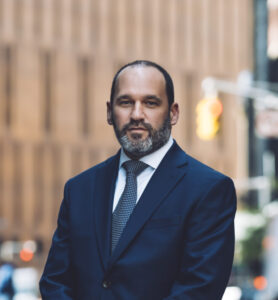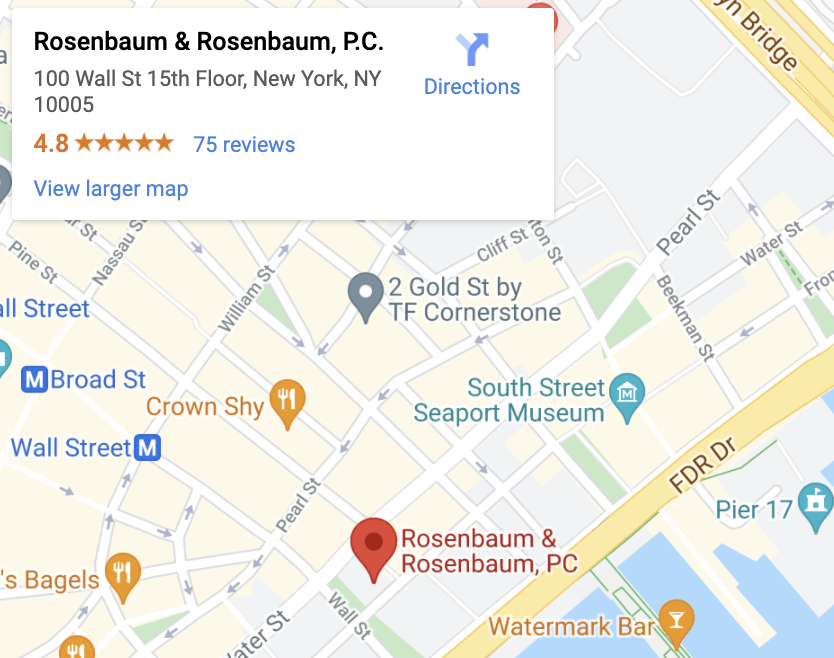New York City Workers’ Compensation FAQs

Were you injured in an accident at work in New York, New York? If so, you might have a lot of questions. The lawyers at Rosenbaum & Rosenbaum, P.C answer your New York City Workers’ compensation FAQs so that you can protect and assert your legal rights.
Our New York City workers’ compensation lawyers have over 40 years of experience and have secured tens of millions of dollars for our clients to date. Contact us today at (212) 514-5007 to set up a free consultation if you’d like to learn more, and continue reading for valuable insight into NYC’s workers’ comp laws.
Table of Contents
How Can a New York City Workers’ Compensation Lawyer Help Me After an Accident at Work?

You might be wondering whether you need a New York, NY, workers’ compensation lawyer after a work injury. Although the process should be straightforward, it’s far from unheard of for a workers’ comp insurance company to dispute a limit a claim. You might also have the ability to file a personal injury claim for additional compensation.
When you hire our New York City personal injury lawyers, you can expect us to provide the following legal services:
- Conduct a thorough investigation into the cause of the accident and who is responsible for it
- Gather evidence to establish your claim
- Ensure your claim is filed accurately and promptly
- Talk with your medical providers to get a clear diagnosis and impairment rating
- Request medical records and other documentation needed in your case
- Negotiate for the benefits to which you are entitled
- Appeal denied workers’ compensation claims
- File any personal injury lawsuits on your behalf, if available
Call us today for your free case evaluation and to learn more about how we can help.
What Is Workers’ Compensation?
Workers’ compensation is a type of insurance that pays for work-related injuries and illnesses. In exchange for giving up your right to sue your employer (though there are exceptions, especially if you work in the construction industry), you receive certain benefits.
Importantly, workers’ compensation is a no-fault system. That means that you can generally get benefits even if you were responsible for your injury.
Which Employers in New York Are Required To Carry Workers’ Compensation?
Virtually all employers in New York are required to provide workers’ compensation insurance. Workers’ compensation is generally required in New York when an employer has non-owner employees. To be covered under workers’ compensation, you must be considered an employee and not an independent contractor.
What Benefits Are Available With Workers’ Compensation?
New York workers’ compensation provides several different types of benefits, including:
Medical Benefits
You can receive payment for the medical benefits related to your workplace injury or illness, including:
- Medical expenses
- Dental expenses
- Surgeries
- Optometry services
- Medically necessary drugs
- Assistive devices
Keep all your medical records and bills to help with your claim.
Lost Wages Benefits
Injured workers may be able to receive compensation for a portion of their lost wages if the injury or illness keeps them out of work for more than seven days, if they have to work fewer hours, or if they have to do other work because of the injury or illness. The full allowable wage benefit is equal to two-thirds of the worker’s average weekly pay, subject to a state maximum.
These wage replacement benefits can take several forms, including:
- Temporary total disability – This disability class applies when the worker cannot work at all but only temporarily. In this situation, they are entitled to the full allowable wage benefit.
- Temporary partial disability – This disability class applies when the worker has lost some ability to work and earn their full wages. Their pay depends on their disability rating.
- Permanent total disability – This disability class applies when the worker is never able to return to work. There is no cap on the number of weeks payable, and payment is based on two-thirds of the average weekly wage, subject to the state maximum.
- Permanent partial disability – This disability class applies when the worker has permanently lost part of their ability to earn a wage. These benefits are based on whether the worker has suffered a schedule loss of use or non-schedule loss.
The exact benefits you are entitled to will be based on the facts and circumstances of your case.
Survivors Benefits
If the workplace illness or injury killed the worker, the worker’s surviving spouse, minor children, or other dependents may be entitled to weekly cash benefits equal to two-thirds of the deceased worker’s average weekly wage. If the decedent did not have a surviving spouse or dependents, their parents or estate may be entitled to payment of $50,000.
Additionally, the family may be able to recover funeral or memorial expenses of up to $10,500 or $12,500, depending on the decedent’s county of residence.
What Should I Do After a Workplace Accident in NYC?
Here are the steps you should take after getting hurt at work:
- Seek medical treatment.
- Notify your supervisor.
- Fill out a workers’ compensation claim form.
You can also speak to a workers’ compensation lawyer to learn more about your legal rights and responsibilities.
Can I Choose My Own Medical Provider?
It depends. If the accident requires emergency medical treatment, you can seek it from any provider. Otherwise, you must use your employer’s Preferred Provider Organization (PPO) if they have one. If they don’t, you can seek treatment from a provider authorized by the Workers’ Compensation Board.
How Much Will My Workers’ Compensation Benefits Be?
The amount of your workers’ compensation benefits is generally two-thirds of your average weekly wages for the preceding 52 weeks of work. There is a state maximum and a state minimum. Your benefits can be affected by various factors, such as:
- Your disability rating
- Whether you are able to work reduced hours or reduced duties
- How long you are out of work
- When you reach maximum medical improvement
- Whether you were working more than one job at the time of your injury
- Whether you are working in a different job while on workers’ compensation
An experienced workers’ compensation lawyer can review your case and give you a better idea about the potential benefits you may be entitled to receive.
When Will I Start Receiving My Lost Wages Benefits?
Your benefits generally start within 18 days after you were injured or 10 days after your employer learned of your injury, whichever is later, as long as your disability lasted at least 14 days and your claim is approved.
If the workers’ compensation insurer disputes the claim, you may have to have your case heard before an administrative law judge. In that case, you would not start to receive your lost wages benefits until the case is resolved in your favor. If you were receiving disability benefits while your case was pending, the benefits are deducted from your lost wages award.
Can I File a Claim Against a Third Party?
In some situations, you may have a claim against a third party in addition to a workers’ compensation claim you file with your employer’s insurance carrier.
Our workplace accident lawyers can evaluate the situation and determine if you may have grounds for a third-party claim. Through a third-party personal injury lawsuit, you can recover substantially more compensation than you can through a workers’ comp claim.
Importantly and as noted above, if you work in the construction industry, New York law provides you with significant legal protection. You may have a claim against your employer in some cases, even. Contact our legal team for more information.
Contact Our NYC Workers’ Compensation Lawyers for Help With Your Claim
If you have reviewed these NYC workers’ compensation FAQs and still have questions, don’t hesitate to reach out at (212) 514-5007 to Rosenbaum & Rosenbaum, P.C. We can discuss your case during a free consultation and advise you on your best legal course of action.

